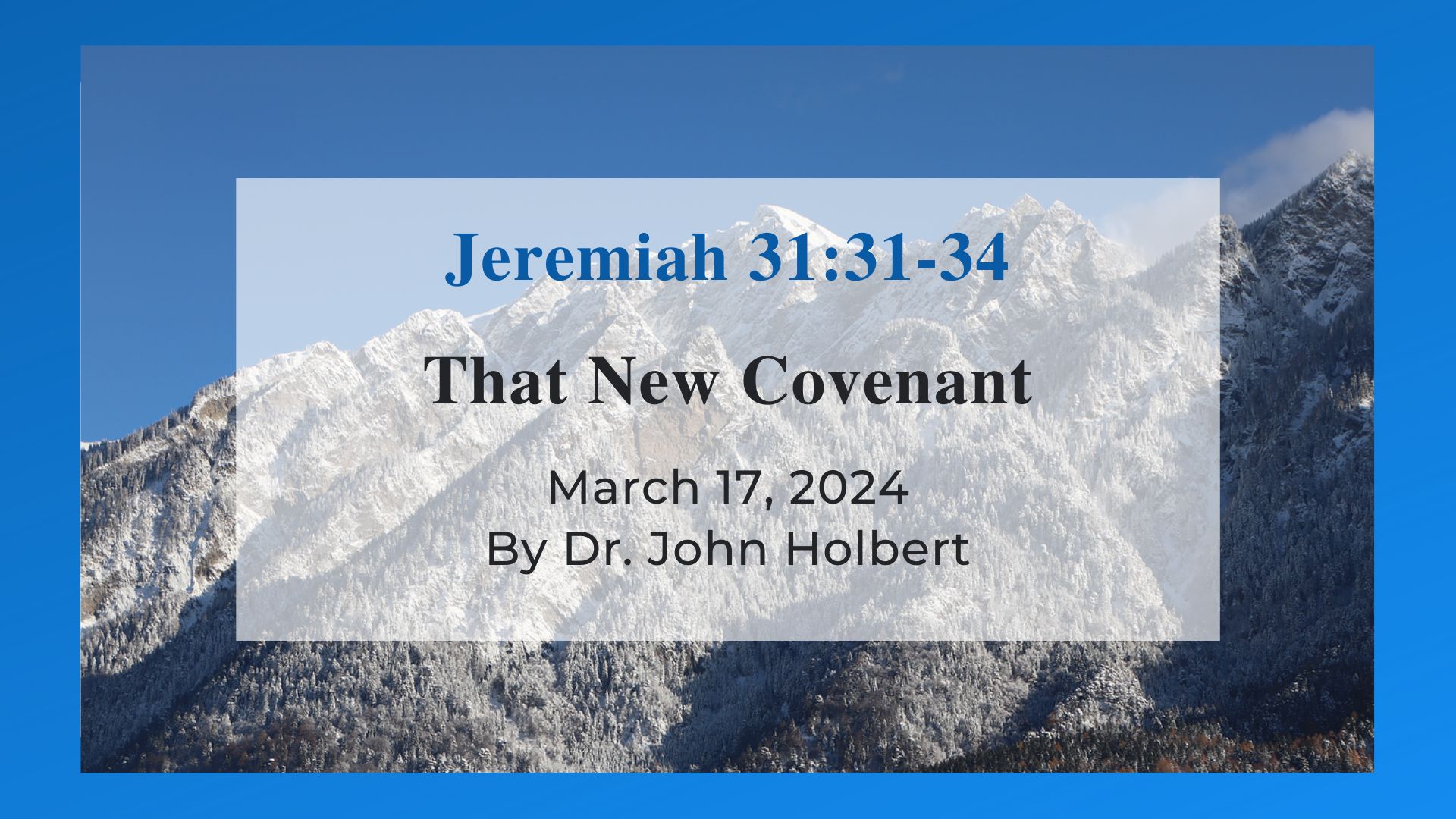That New Covenant - Reflections on Jeremiah 31:31-34
by Dr. John Holbert on Monday, March 11, 2024

That New Covenant
Jeremiah 31:31-34
The Peripatetic Hebrew Bible Preacher
This short passage from Jeremiah has long played an outsized role in general discussions of the Bible. It did not take long for early New Testament commentators to see in these words a prediction of the appearance of the documents based on the life, death, and resurrection of the one they called Messiah, Jesus, that they thought would finally and definitively replace the Hebrew Bible as the crucial sacred text for them. After all, does it not promise a “new covenant,” one not like “the covenant I, YHWH, made with their ancestors when I took them by the hand to bring them out of Egypt” (Jer.31:32). The “old” covenant, the one made with Abraham, Isaac, Jacob, Moses, David, etc. has, they imagined, been superseded by a new covenant, made up of the Torah now “written on their hearts.”
I want to suggest, however, that the “newness” of this covenant is not because it is different in content from the old one, not that the old biblical heroes/heroines who carried that covenant were now to be seen as obsolete, taken over, or to be denigrated and forgotten. To the contrary! I see nothing here in Jeremiah’s oracle that says the content of the old covenant is somehow deficient. The new thing for the new covenant is that it will be delivered to God’s people in a very different way. The Torah first given to Israel is still very much in force. Its basic elements are still determinative for those who would follow God. That Torah consists of the stories, laws, and ethical demands delivered and carried by the persons I listed above. According to Jeremiah, it is not some new figure who will bring a different covenant; in that, I think the early Christian readers of this text got it quite wrong. The Torah brought by Jesus is in the main the Torah announced by Moses.
What is new is at the same time exhilarating and dispiriting. Listen carefully to what Jeremiah sees in the future of the Torah of YHWH. “I will place my Torah within them; I will write it on their hearts; I will be their God and they will be my people” (Jer.31:33) YHWH proposes here great divine surgery, quite directly writing the Torah on their hearts, that is on the organ that carries the seat of human will and intelligence. That sounds grand enough, with God grabbing each person by the lapels, cracking open their breastbones, and incising right on their pumping hearts what God has been saying since God first acted in the creation of the world. By implication, of course, that means that the only way to get this divine thing right is for God to do it by God’s own hand.
To make that even more clear, the prophet continues. “No longer will they teach one another, or say to each other, ‘Know YHWH!’ They will (at last?) all know me, from the least of them to the greatest,’ says YHWH. I will (finally?) forgive their iniquity, and remember their sin no more” (Jer.31:34). Well, of course! With YHWH’s Torah written on every individual heart, there can inevitably be no more sin or iniquity, hence YHWH will have no need of forgiveness or memory of any sin.
There is the exhilarating part. Sin is wiped out; God and humans are fully reconciled; all will know YHWH fully. Wonderful, no? Note, however, in this glorious state, no teachers or preachers will be needed ever again! You and I are out of jobs, since everyone will automatically know YHWH and YHWH’s Torah. But, of course, is that not what we teachers and preachers have been after since we heard God’s call, that is to make ourselves redundant, to teach and preach in such ways that all will finally know God fully? This text tells us in no unceratin terms that we have failed miserably at this task, and that only a direct intervention from God will bring to pass what God has long wanted: a world full to the brim with those who know God and what God has willed for the universe from the start.
And there is the dispiriting part. And unlike those early Christians who imagined that the old covenant has been overcome by the new in Jesus, I must say that great divine surgery is still needed though Jesus’s coming is now over 2000 years ago. Jesus’ attempts to write Torah on our hearts has plainly not worked any more than Jeremiah’s prediction promised some 2700 years ago. The very fact that I am writing this essay, and the very fact you are reading it and may or may not use it to inform one of your sermons makes it all too plain that great divine surgery is still to come. That reality makes our jobs secure, but tells us at the same time that our job still needs doing, because Jeremiah’s oracle remains unfulfilled, despite the eloquence of the prophets of Israel and despite the coming of Jesus. You and I will certainly shuffle off this mortal coil and others will follow us in the work, and the possibility of a universal knowledge of YHWH will still not be among us.
So, what to do this Lent? Jeremiah’s oracle of promise goads all of us forward, trusting that “the days are surely coming” when the “earth will be full of the Torah of God as the waters cover the seas,” as Isaiah says it. You and I and God together have our jobs still to do, and though we will not see their end, the promise is that one day that end will come, and it will be glorious. Meanwhile, back to work!
